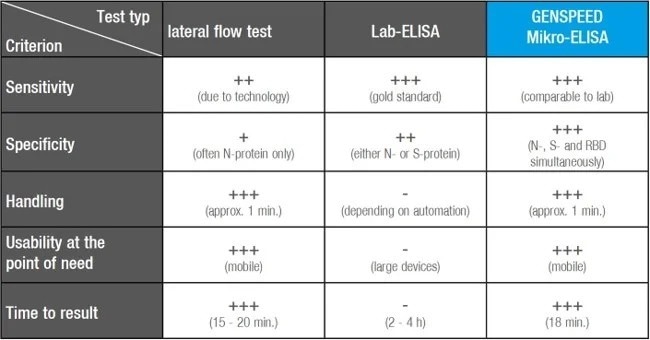The practice of performing diagnostic tests right where the results are required is known as point-of-care testing (POCT). This could be:
- In a pharmacy
- On the patient’s ward
- In a certified doctor’s practice
To put it another way, local laboratories, rather than a central lab, provide laboratory tests on patients. Pregnancy tests and blood glucose checks performed by diabetics are two instances of this.
Testing at the point of care for viruses like MRSA or COVID-19 is incredibly interesting for the microfluidics industry. There are a number of options here to carry out these tests quickly and comprehensively without sending samples to main laboratories.
Together with GreinerBioOne, Bartels Mikrotechnik has created a test method for this purpose that facilitates the easy identification of all important diseases and hospital-related microorganisms. GenSpeed Biotech is the company that distributes the portable device.
GenSpeed Biotech-Diagnostic system for MRSA & COVID-19
The diagnostic system from GenSpeed Biotech allows point-of-care tests for a variety of viruses and microorganisms:
MRSA is frequently referred to as the hospital germ because it is particularly prevalent there as a result of the regular use of antibiotics. Other multi-resistant pathogens, however, pose a hazard to human health. Therefore, it is crucial to swiftly identify and eliminate resistant hospital pathogens.
The device can also easily and affordably be changed to work with different viruses or microorganisms. So, it is simple to switch between COVID-19 and MRSA. The ability to identify the viral load is a significant benefit over simple rapid tests. Therefore, not only is it tested whether antigens are present, but also in what quantity they are present.
Additionally, antibodies can be tested, and thus an unrecognized and survived disease or the immune status can be visualized and quantitatively classified. A decision as to whether more vaccinations are required can then be made, for instance, in the case of COVID-19 testing. This makes complete point-of-care testing possible.
While being smaller and more affordable than a large laboratory, the point-of-care diagnostic system is much more accurate than a rapid antigen test. Given that the system is entirely digital, quantifiable measures are possible, allowing for tracking and monitoring.
Source: Bartels Mikrotechnik GmbH

This liquid handling system for point-of-care testing includes the mp6 micropump, which is a key component. The actual antigen test chip must be filled with the sample and various liquids for the result to be accurate. For reliable test results, it is vital that the liquids are accurately conveyed.
Video: Point-of-care testing using the mp6
In the video below, an ELISA test is used as an example to demonstrate how point-of-care testing functions. Users can watch how the mp6 micropump takes inactive microfluidic chips and converts them into active components.
The different phases can be optically examined by a sensor once the chip is loaded with the sample and a reaction is started by two reagents. The optical analysis can then be reviewed and documented digitally and automatically.
Point of Care Testing POCT using Micropump, Microfluidic Chip and Optical Sensor
Video Credit: Bartels Mikrotechnik GmbH
Even the smallest and most complicated structures can be filled quickly and safely, thanks to the combination of the slender, compact, and cost-effective system and the electronically controlled mp6 micropump.
Thus, it is possible to perform tests and diagnostics right at the point of care rather than in a laboratory, saving both time and money. This point-of-care testing method has a quick turnaround time, great sensitivity, and specificity. It can be utilized independently. It makes it possible to run high-quality tests without the need for specialized personnel.